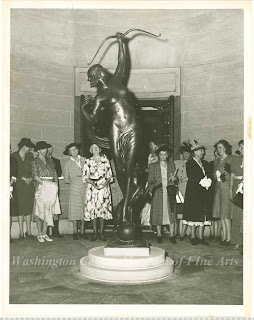Post
by: Jennifer Chapman Smith
Collections and
Exhibitions Manager
Yesterday, November 12, was Auguste Rodin’s birthday. Maybe you saw the Google Doodle yesterday – if not here is a link to an article with a picture of it
http://www.latimes.com/entertainment/arts/culture/la-et-cm-auguste-rodin-google-camille-claudel-20121112,0,3763540.story
The
WCMFA is especially privileged to have a variety of sculptures by Rodin in the
permanent collection. Many of these sculptures were given to the museum by our
founders William Henry and Anna Brugh Singer, Jr. who admired Rodin’s work. One
of the WCMFA’s Rodin sculptures is St.
John the Baptist, a bronze done in 1878, and currently on view in the
museum’s Schreiber Gallery.
This
sculpture clearly shows Rodin’s devotion to the naturalism of the human body. As
Dr. Elizabeth Johns writes in “One Hundred Stories: Highlights from the
Washington County Museum of Fine Arts,” [r]ejecting the idealizing
Neoclassicism of academic sculpture that was the standard when he began his
studies, he insisted on fidelity to human anatomy and evocation of the emotions
of his subjects. He hired ordinary people from the street to be his models,
creating his sculptures in clay or plaster. These media could show the firmness
of bone, the ripple of muscles, the shadows of body contours. Cast in bronze,
the sculptures provide the almost contradictory pleasures of seeing a
naturalistic representation in a hard medium.”
Rodin
was inspired by the work of Michelangelo and Donatello and brought this
inspiration to the creation of St. John
the Baptist. The WCMFA’s piece is a casting from a smaller study for a
larger work standing 6 feet 5 inches – the WCMFA’s version is 31 inches high.
Rodin’s larger St. John the Baptist is
still not as tall as the WCMFA’s iconic Diana
of the Chase by Anna Hyatt Huntington, which stands about 8 feet tall.
Unveiling of Diana of the Chase in the WCMFA's Rotunda, 1942


No comments:
Post a Comment